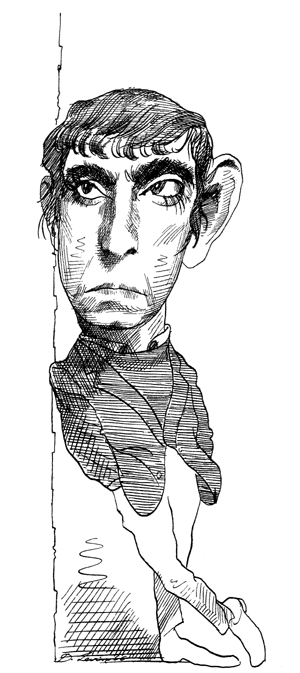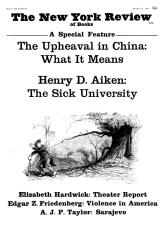Yet once again, o ye laurels! We open the season here in New York with another of those little surprises to which our society is given, those subtle seepages and shrinkings that mock the expanding walls. We have reached in a time of diversity, a sort of accidental monotheism in the theater: There is now only one influential daily critic, Walter Kerr, writing in The New York Times. It has generally been said In the theater that for a straight play only the Times “really matters.” The prestige and distribution of the Times conferred upon the critic, whoever he might be, extraordinary powers. But still there was the Herald-Tribune, perhaps put into second place because of its lesser economic strength, and yet clearly influential. It has always been atrocious that the theater should have been under the dominion of the immediate journalistic response—a tyranny both peculiar and unnecessary. None of the other literary arts has ever lain so submissively under the bones of its judges—or now, its judge. Daily reviews have appeared to be the only means of marketing the dramatic product and so gradually the fate of the whole enterprise has been entrusted to the shuffling goodwill of “the critics.” Producers, actors, and writers bend, saying with resignation: in their fitful taste is our salvation. A certain middle-ground project might fare well enough, and yet for other plays and productions the opinions of the daily press are of no consequence whatsoever. Nevertheless, the highest and the lowest have had to beseech, to hope.
The power of the Times is intolerable and this would be true if Walter Kerr were George Bernard Shaw, which he is not. Kerr’s taste, in the past, has been special: His impatience with experimental art is radical, his forbearance in the case of light comedies and genre pieces, such as The Subject Was Roses, is excessive. The theater will have to find some way to make the public aware of opinions other than those held by the daily press. Certain possibilities suggest themselves as a way to relieve the bondage to reviewers; the bondage is also one of the time. (Many things are gone, or crippled and abashed, before even the weekly press can offer a judgment.) During the previews, which seem to be universal now, showing among other things that apparently people will go to plays until they are told not to do so, the authors could invite the presence and solicit the opinions of those persons whose word might be relevant in forming the public taste. These short statements could be printed on opening day, in the advertisements, just as a publisher prints opinion on the back of books. Blurbs, of course, are not criticism and tend drastically toward the positive, the negative lying buried in dots. Still, they tell us something more important than most of the reviews the public relies upon: They tell us the level of the intentions of the work, give testimony to those to whom the dramatist has hopefully addressed himself. We might then have some idea, however imperfect, of the general nature of the work offered without consulting the reviewers alone on the day after opening night. Meanwhile, a threatening innovation, a “technological advance,” has already grown up around us. Television announcers are moonlighting as “drama critics.” The possibilities here outdistance one’s powers to prophesy.
EDWARD ALBEE’S A Delicate Balance is a dull play; that is indeed the most interesting thing about it. One spends the evening thinking with surprise of all the things it is not. No, it is not spare and sharp like The Zoo Story; it is not brassy and voluble like Virginia Woolf: it is not chic and mysterious like Tiny Alice. No, it is not like any other Albee, but it echoes every one except the author himself. Listening, I thought of T. S. Eliot, Noël Coward, S. N. Behrman, and George Kelly. It is very old-fashioned, fixing itself in one of those carefully nurtured suburban houses with ferns and velvet sofas, a more or less timeless Scarsdale that reminded me poignantly of Ina Claire and “fatal weaknesses” and “deep Mrs. Sykeses,” and then suddenly a bit of suburbanized Eliot, which was less poignant, and simply rhetorical. A good deal of the dialogue has a fleshless vehemence; it is not rooted in the particular, but moves toward the general and becomes at last just so much unmotivated heavy breathing. The structure of the play is repetitive and amateurish. There is only one important bit of stage business and that is the mixing of drinks; action and dialogue return to this both “later that evening,” and “early the next morning.” But more tedious and static is the habit of the characters for assembling the family—“Well, here we all are”—and producing like a vaudeville act revelations of feeling. The central character, Tobias (and a reading of the Book of Tobit did not produce any deepening allegory to enhance the play) tells a set piece, inserted like a block of stone, about killing a cat that wasn’t fond of him. Mmmmm. And the wife has her inning with a story of coitus interruptus years ago, after the death of a son. Well, maybe. And so it goes on. A nervous daughter returns home again, having fled from her fourth husband. About this, we are asked to feel a failure of the family: They should be calling up the husband, trying to patch things up, instead of merely taking the girl in once more.
Advertisement
Into this household, seen so many times on the American stage (“In our family there was no relating,” as the old Nichols and May record had it), there comes a plain and rather voiceless couple. They are the best friends of Tobias and Agnes. They mutter something about having seen fear (in a handful of dust under the bed?), and it develops ludicrously that they simply intend to move in forever, moving from their apparently also “richly appointed” house into the many times divorced daughter’s room. The arriving couple are not up to much helpful exposition; yet we at first welcome their appearance in the hope it will advance the plot. But it appears we are not to know what they have seen, why they are afraid. Their only secret is that they have appeared to tell us that these suburban couples, arid and chagrined as they are, do not even truly feel friendship for others like themselves. In showing a reluctance, however nicely polite and hedging, to lodge their friends for the rest of their days, Tobias and Agnes have failed the test of life. For my part, I should imagine most of the audience, in all honesty, would be compelled to support them in their failure. The moral and dramatic level of the choice could scarcely be more ridiculous. The very dialogue itself is a social and aesthetic perturbation. The women often speak a sort of stage diction heard in English comedies a few decades ago. “Whatever do you mean?” Agnes intones grandly. And the little mouse of a neighbor mumbles rhetorical questions which end with “Is it not?”
Jessica Tandy and Hume Cronyn are resolutely competent performers, not greatly favored with those rich charms that usually lead young persons to seek a career on the stage. In the banal and unsteady edifice of the play, there are merely two posts that maintain but do not decorate.
This Issue
October 20, 1966




